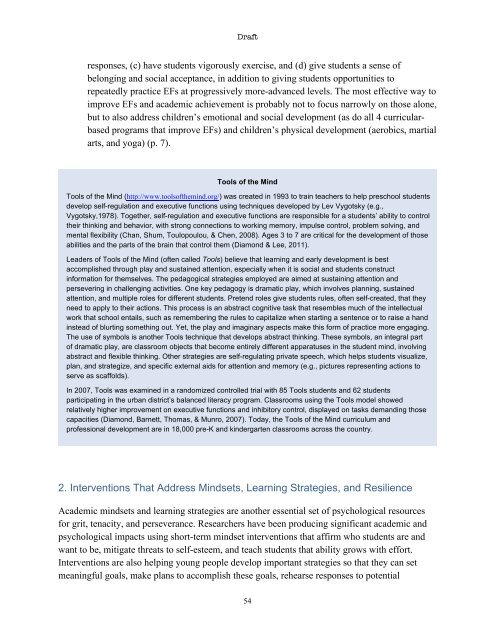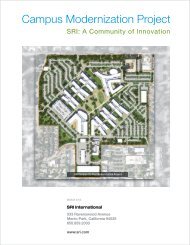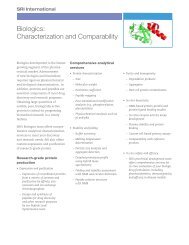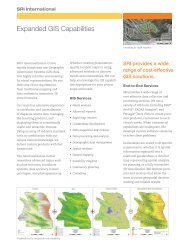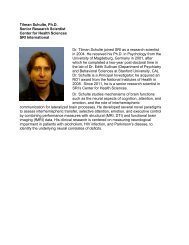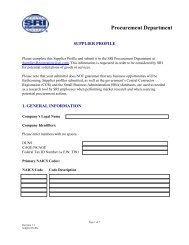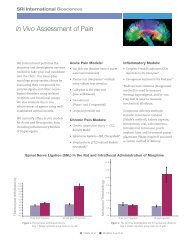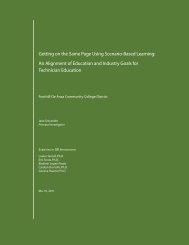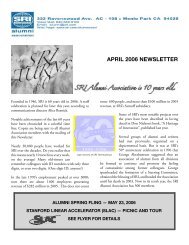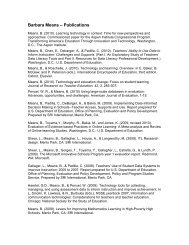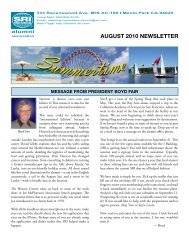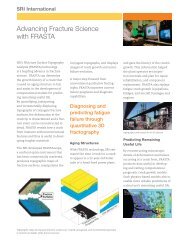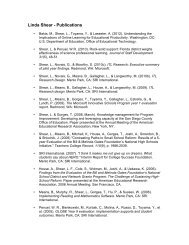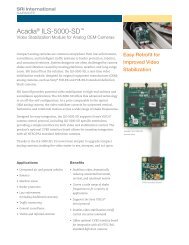Promoting Grit, Tenacity, and Perseverance - U.S. Department of ...
Promoting Grit, Tenacity, and Perseverance - U.S. Department of ...
Promoting Grit, Tenacity, and Perseverance - U.S. Department of ...
Create successful ePaper yourself
Turn your PDF publications into a flip-book with our unique Google optimized e-Paper software.
Draft<br />
responses, (c) have students vigorously exercise, <strong>and</strong> (d) give students a sense <strong>of</strong><br />
belonging <strong>and</strong> social acceptance, in addition to giving students opportunities to<br />
repeatedly practice EFs at progressively more-advanced levels. The most effective way to<br />
improve EFs <strong>and</strong> academic achievement is probably not to focus narrowly on those alone,<br />
but to also address children’s emotional <strong>and</strong> social development (as do all 4 curricularbased<br />
programs that improve EFs) <strong>and</strong> children’s physical development (aerobics, martial<br />
arts, <strong>and</strong> yoga) (p. 7).<br />
Tools <strong>of</strong> the Mind<br />
Tools <strong>of</strong> the Mind (http://www.tools<strong>of</strong>themind.org/) was created in 1993 to train teachers to help preschool students<br />
develop self-regulation <strong>and</strong> executive functions using techniques developed by Lev Vygotsky (e.g.,<br />
Vygotsky,1978). Together, self-regulation <strong>and</strong> executive functions are responsible for a students’ ability to control<br />
their thinking <strong>and</strong> behavior, with strong connections to working memory, impulse control, problem solving, <strong>and</strong><br />
mental flexibility (Chan, Shum, Toulopoulou, & Chen, 2008). Ages 3 to 7 are critical for the development <strong>of</strong> those<br />
abilities <strong>and</strong> the parts <strong>of</strong> the brain that control them (Diamond & Lee, 2011).<br />
Leaders <strong>of</strong> Tools <strong>of</strong> the Mind (<strong>of</strong>ten called Tools) believe that learning <strong>and</strong> early development is best<br />
accomplished through play <strong>and</strong> sustained attention, especially when it is social <strong>and</strong> students construct<br />
information for themselves. The pedagogical strategies employed are aimed at sustaining attention <strong>and</strong><br />
persevering in challenging activities. One key pedagogy is dramatic play, which involves planning, sustained<br />
attention, <strong>and</strong> multiple roles for different students. Pretend roles give students rules, <strong>of</strong>ten self-created, that they<br />
need to apply to their actions. This process is an abstract cognitive task that resembles much <strong>of</strong> the intellectual<br />
work that school entails, such as remembering the rules to capitalize when starting a sentence or to raise a h<strong>and</strong><br />
instead <strong>of</strong> blurting something out. Yet, the play <strong>and</strong> imaginary aspects make this form <strong>of</strong> practice more engaging.<br />
The use <strong>of</strong> symbols is another Tools technique that develops abstract thinking. These symbols, an integral part<br />
<strong>of</strong> dramatic play, are classroom objects that become entirely different apparatuses in the student mind, involving<br />
abstract <strong>and</strong> flexible thinking. Other strategies are self-regulating private speech, which helps students visualize,<br />
plan, <strong>and</strong> strategize, <strong>and</strong> specific external aids for attention <strong>and</strong> memory (e.g., pictures representing actions to<br />
serve as scaffolds).<br />
In 2007, Tools was examined in a r<strong>and</strong>omized controlled trial with 85 Tools students <strong>and</strong> 62 students<br />
participating in the urban district’s balanced literacy program. Classrooms using the Tools model showed<br />
relatively higher improvement on executive functions <strong>and</strong> inhibitory control, displayed on tasks dem<strong>and</strong>ing those<br />
capacities (Diamond, Barnett, Thomas, & Munro, 2007). Today, the Tools <strong>of</strong> the Mind curriculum <strong>and</strong><br />
pr<strong>of</strong>essional development are in 18,000 pre-K <strong>and</strong> kindergarten classrooms across the country.<br />
2. Interventions That Address Mindsets, Learning Strategies, <strong>and</strong> Resilience<br />
Academic mindsets <strong>and</strong> learning strategies are another essential set <strong>of</strong> psychological resources<br />
for grit, tenacity, <strong>and</strong> perseverance. Researchers have been producing significant academic <strong>and</strong><br />
psychological impacts using short-term mindset interventions that affirm who students are <strong>and</strong><br />
want to be, mitigate threats to self-esteem, <strong>and</strong> teach students that ability grows with effort.<br />
Interventions are also helping young people develop important strategies so that they can set<br />
meaningful goals, make plans to accomplish these goals, rehearse responses to potential<br />
54


